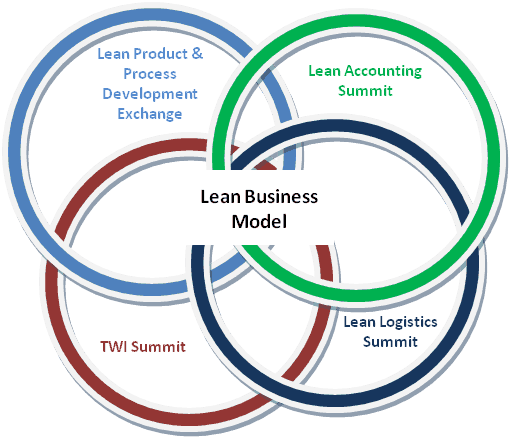 Mark's note: Today's guest blogger is Jim Huntzinger, the organizer of many topical Lean Summits including Lean Accounting, Training Within Industry, and Lean and Green. We talked about Lean Accounting in Podcast #33.
Mark's note: Today's guest blogger is Jim Huntzinger, the organizer of many topical Lean Summits including Lean Accounting, Training Within Industry, and Lean and Green. We talked about Lean Accounting in Podcast #33.
In this post, Jim talks about a number of these different “movements” and how they really need to be integrated into a true Lean Enterprise or Lean Business view.
Linking the Lean Enterprise
A number of “Lean” movements are showing up in the form of annual events. These gatherings are having a significant impact on organizations. Particularly in the areas of accounting, product and process development, logistics, and training. But these movements – which represent specific business functions – do not perform in isolation. They all must function together as integrated facets of a business enterprise. Just like systems of the human body – circulatory, respiration, nervous, and so forth – they are interconnected physically and functionally, otherwise, life of the human body would cease. The business organization is no different. Implementing these systems cannot be done successfully in isolation.
As the diagram illustrates, these movements are all interlinked. While expertise in each area must be developed, what also must be developed is an understanding of the cross dependency each has on the other functions of the business. For high level success there is no alternative. But, unfortunately, few companies have successfully accomplished this. This situation is, in part, the reason for the rise of these movements – to give organizations, and individuals within these organizations, the opportunity to learn and understand both the function of each of these unique parts, and their integrative relationship with the rest of the business enterprise. That translates into developing key people in each discipline with the skills and knowledge to lead, guide, and grow others in their organizations.
For example, lean accounting covers how an organization accurately reflects cost information in order for the decision-makers can make better informed decisions. Since, other than operations, logistics and product development have the largest impact on a company's financial health, lean accounting plays a direct role in support both logistics and product development. Logistics are tied to product development since procuring and shipping supplied components and finished products are essential to day-to-day success. And TWI (Training Within Industry) is foundational to developing the skills of people to drive continuous improvement and good standard work in any function of a business.
The newest movement, the Lean Logistics Summit, (www.leanlogisiticssummit.com) kicks off its inaugural event June 22-23 in Cincinnati, OH. At this gathering of lean logistics proponents, the Lean Enterprise Institute will launch their new book, Building a Lean Fulfillment Stream. Co-authors Robert Martichenko and Kevin Von Grabe will be presenting at the Lean Logistics Summit. Join this inaugural event and fully integrate all enterprise systems in your lean business model
Jim Huntzinger is the founder and President of the Lean Accounting Summit, TWI Summit, and Lean and Green Summit. You can read more about Jim in his Q&A at the Evolving Excellence blog. You can also find him online at www.advancinglean.com.
Linking the Lean Enterprise
Please scroll down (or click) to post a comment. Connect with me on LinkedIn.
Let’s build a culture of continuous improvement and psychological safety—together. If you're a leader aiming for lasting change (not just more projects), I help organizations:
- Engage people at all levels in sustainable improvement
- Shift from fear of mistakes to learning from them
- Apply Lean thinking in practical, people-centered ways
Interested in coaching or a keynote talk? Let’s talk.
Join me for a Lean Healthcare Accelerator Trip to Japan! Learn More











Jim, I think your missing a ring! Lean Sales and Marketing. Not sure a company can ever become Lean without Sales and Marketing on board, your most important link to the customer.
P.S. Your event looks awesome. Have a great summit.
Comments are closed.